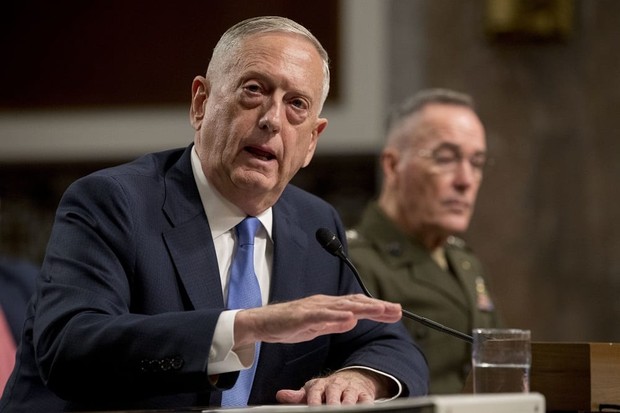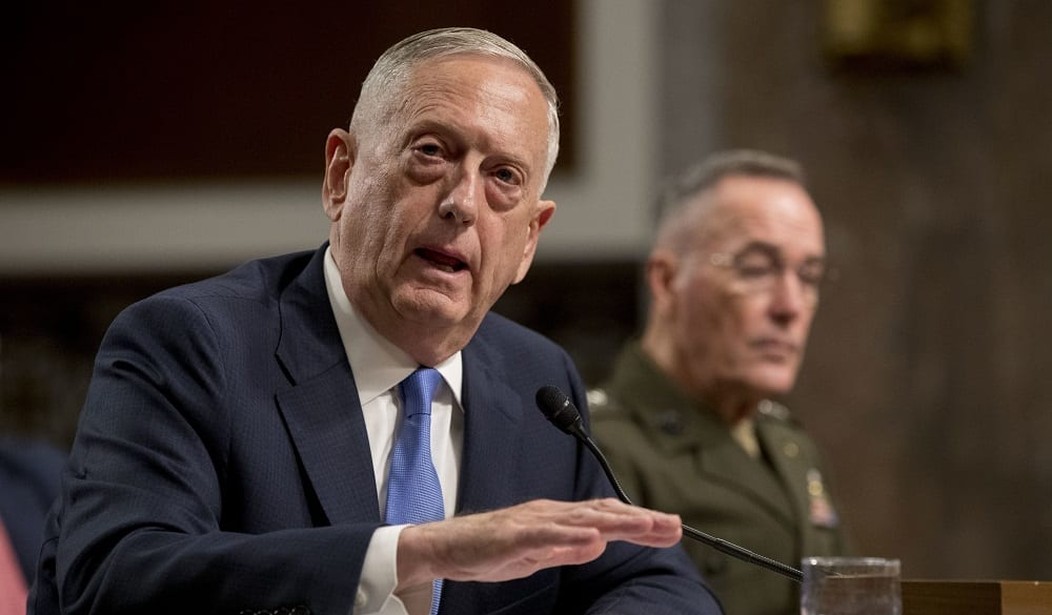
Defense Secretary Jim Mattis, left, accompanied by Joint Chiefs Chairman Gen. Joseph Dunford, speaks on Afghanistan before the Senate Armed Services Committee on Capitol Hill in Washington, Tuesday, Oct. 3, 2017. (AP Photo/Andrew Harnik)
When President Trump signed the sanctions bill Congress passed targeting Russia in August 2017 required the Treasury Department to impose sanctions on any individuals doing business with the Russian Ministry of Defense. Like most bills Congress passes without adequate research, this requirement for mandatory sanctions has come back to bite the United States in the butt.
Many of our recent allies are users of Russian military equipment. This includes NATO allies who were former Soviet republics or Warsaw Pact states like the Baltic States, Poland, Hungary, and the Czech Republic. It includes NATO “allies” like Turkey. It includes emerging allies like India. And it includes formerly hostile states that are on the cusp of regarding the United States as a guarantor of their independence, like Vietnam.
In January, the administration announced it was not going to impose sanctions on nations buying Russian military equipment:
The Trump administration announced Monday that it had decided against imposing any sanctions on countries that buy Russian military equipment, saying that a new law was already deterring billions of dollars in such purchases.
The law required that sanctions be imposed against large purchasers of Russian arms, but it granted exceptions for a variety of reasons. The administration explained the exceptions it was citing to members of Congress in a classified briefing on Monday.
“We estimate that foreign governments have abandoned planned or announced purchases of several billion dollars in Russian defense acquisitions” since the enactment of the law in August, said Heather Nauert, the State Department spokeswoman.
Defense deals are often years in the making, so last year’s law, called the Countering America’s Adversaries Through Sanctions Act, is only just beginning to have an effect, an administration official said.
Now, known Russian stooge, Secretary of Defense James Mattis, is asking for Congress to officially remove the requirement for sanctions for purchasers of Russian military equipment:
Jim Mattis condemns Russian actions yet urges waivers for arms sales https://t.co/DbQwY2rtpG pic.twitter.com/dAMeniBTtU
— Bloomberg (@business) July 19, 2018
U.S. Defense Secretary Jim Mattis said Russia should pay a price for its “destabilizing behavior,” but added that any punishment shouldn’t apply sanctions to allies who buy Russian military equipment.
In a letter Wednesday to Senate Armed Services Committee Chairman John McCain, Mattis urged lawmakers crafting a fiscal 2019 defense policy bill to let the State Department waive sanctions intended to restrict purchases of Russian equipment by other countries. The Pentagon chief argued that the U.S. has a strategic interest in working with nations that are transitioning to closer ties with America but may still depend on Russian equipment.
…
Now the Pentagon chief wants the secretary of state be given the waiver authority as part of the defense bill that’s under negotiations this week.“Without a national security waiver option, in the end we will pay a greater strategic price than Russia by pushing potential partners into deeper dependency on Russia,” Mattis wrote. He added that “some nations who now actively seek a security relationship with the United States still rely on Russia for spare parts and other material needed to sustain” their equipment “during the transition period” to closer U.S. relations.
Mattis warned that failing to grant the State Department the waiver authority risks “inadvertently giving Russia a significant strategic advantage” and places “undue burden on current and future allies and partners.”
Congress has a role in foreign policy, but I think time and again it has been shown that Congress’s role is best carried out as an oversight of executive action. Often Congress doesn’t have the sack to man up and do much about things where it has a role (the Benghazi hearing, for instance). When it takes its own action it performs more like a monkey humping a football than a latter day Metternich (the 1973 Church Amendment forbidding support to the South Vietnamese government comes to mind).
Here the congressional action was driven by Democrats eager to push the Russian-collusion narrative and by Republicans who were either hostile to Trump and wanted to stick a finger in his eye or Republicans who simply didn’t have the courage to take a stand against a very bad bill.
Hopefully, Mattis will get his request. But I wouldn’t count on it.
=========
=========
Like what you see? Then visit my story archive.
Follow @streiffredstate
I’m on Facebook. Drop by and join the fun there.
=========
=========














Join the conversation as a VIP Member